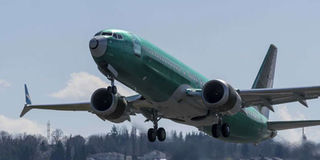'Damning' Boeing emails say 737 MAX was 'designed by clowns'

A Boeing 737 MAX 8 airliner takes off from Renton Municipal Airport near the company's factory, on March 22, 2019 in Renton, Washington. FILE PHOTO | STEPHEN BRASHEAR | AFP
What you need to know:
"Would you put your family on a MAX simulator trained aircraft? I wouldn't," a Boeing employee wrote to a colleague in one newly-released 2017 exchange.
"No," the colleague answered.
New York
Boeing employees bantered about whether the 737 MAX was safe to fly and joked that the aircraft was "designed by clowns who in turn are supervised by monkeys," according to emails released late Thursday.
"Would you put your family on a MAX simulator trained aircraft? I wouldn't," a Boeing employee wrote to a colleague in one newly-released 2017 exchange.
"No," the colleague answered.
The communications, released by Boeing following their disclosure to lawmakers and regulators, raised fresh questions about the aerospace giant, which has been in crisis mode since March following a pair of MAX crashes that claimed 346 lives and grounded the company's best-selling plane.
The latest disclosures could complicate efforts by Boeing to win approval from the Federal Aviation Administration to return the plane to service and may amplify calls in Congress for more profound steps by Boeing to address company culture after the aerospace giant ousted its chief executive in December.
The latest internal emails -- called "incredibly damning" by one top lawmaker -- come on the heels of a shock exchange publicly disclosed in October in which a Boeing pilot called a flight handling system implicated in the two crashes "egregious."
The internal exchanges happened cover as Boeing was working to persuade the FAA that pilots would not need simulator training to fly the new MAX, arguing that training on computer tablets would be sufficient.
"I still haven't been forgiven by God for the covering up I did last year," one employee wrote in a message from 2018 in reference to dealings with the Federal Aviation Administration (FAA).
"I know but this is what these regulators get when they try and get in the way. They impede progress," another wrote in August 2015.
"This airplane is designed by clowns, who in turn are supervised by monkeys," another employee said in 2017, apparently in reference to the FAA.
Boeing apologised for the tone of the messages, which it said were sent to congressional investigators in the interest of transparency.
"We regret the content of these communications, and apologize to the FAA, Congress, our airline customers, and to the flying public for them," the company said
"We have made significant changes as a company to enhance our safety processes, organizations, and culture," the company said, adding that it will ultimately take "disciplinary or other personnel action, once the necessary reviews are completed."
Although some of the communications joke about problems with MAX simulators, but "having carefully reviewed the issue, we are confident that all of Boeing's MAX simulators are functioning effectively," Boeing said.
The FAA said while the "tone and content of some of the language contained in the documents is disappointing," the emails did not reveal any new safety risks.
"Our experts determined that nothing in the submission pointed to any safety risks that were not already identified as part of the ongoing review of proposed modifications to the aircraft," an FAA spokesman said.
"We continue to work with other international aviation safety regulators to review the proposed changes to the aircraft. Our first priority is safety, and we have set no timeframe for when the work will be completed."
Representative Peter DeFazio, the Oregon Democrat leading the House investigation of the MAX, called the emails "incredibly damning."
"They paint a deeply disturbing picture of the lengths Boeing was apparently willing to go to in order to evade scrutiny from regulators, flight crews and the flying public."
In late December, after months in crisis mode, Boeing pushed out its embattled chief executive, Dennis Muilenburg, in part due to tensions with the FAA.
The company replaced him with longtime board member David Calhoun, who is set to take over next week.
Boeing on Tuesday reversed its earlier position and endorsed simulator training for MAX pilots prior to resuming flights, a change likely to further delay the aircraft's return to the skies.
Boeing share price dipped 0.4 percent to $335.10 in early trading Friday.





